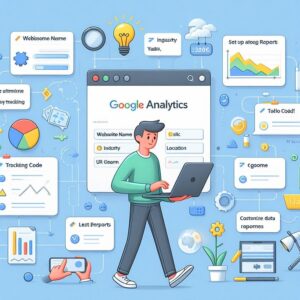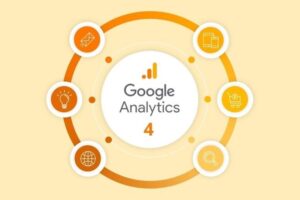In today’s data-driven marketing landscape, understanding key metrics in Google Analytics is essential for turning raw numbers into actionable strategy. Whether you’re a beginner or a growing digital marketer, understanding key metrics in Google Analytics helps you measure success, identify opportunities, and improve your online strategy.
At Digital Campus, we ensure every student learns how to confidently use Google Analytics and interpret its insights. Let’s break down the key metrics you need to know and how they drive results.

1. Users
This metric shows how many distinct users have visited your site—each counted only once, no matter how often they return. It’s a great way to measure the growth of your online audience over time. ou’ll often see two terms:
Users: First-time visitors during a selected date range.
New vs Returning Users: This metric reveals how many visitors are discovering your site for the first time versus those who keep coming back—giving insights into brand loyalty and user engagement.
2. Sessions
A session refers to a set of actions—like page views, clicks, or form submissions—by a single user within a 30-minute window. Think of it as a visit. A session could include:
Visiting multiple pages
Watching videos
Filling out a form
Sessions help measure overall traffic activity and user behavior.
3. Average Session Duration
This tells you how much time people spend on your site per visit. If it’s short, your content may not be engaging or relevant.
🔹 Tip from Digital Campus: Improve this metric with stronger calls-to-action, engaging visuals, and helpful content.
4. Bounce Rate / Engagement Rate
Bounce Rate (Universal Analytics): This shows the percentage of visitors who land on your site and leave without interacting with any other page.
Engagement Rate (GA4): In Google Analytics 4, bounce rate is replaced by Engagement Rate, which measures if users stay longer than 10 seconds, view 2+ pages, or complete a conversion event.
A high bounce rate could mean your website isn’t meeting visitor expectations—maybe it’s slow, hard to navigate, or the content doesn’t match what they’re looking for.
5. Pages per Session
This metric reveals how many pages a visitor typically explores during a single session on your website. The more pages visited, the better your internal linking and content flow likely are.
Strategy Tip: Use CTAs and related posts to encourage deeper exploration.
6. Conversion Rate
One of the most crucial metrics. A conversion is a goal completion—whether it’s signing up for a newsletter, submitting a form, or making a purchase.
Track this metric to understand how well your site is performing against business objectives.
7. Traffic Sources
Knowing where your users come from helps you understand which marketing channels are most effective. Google Analytics categorizes them as:
Organic Search (Google/Bing)
Direct (typed URL)
Referral (from another website)
Social (Facebook, Instagram)
Email
Paid Ads
At Digital Campus, we teach you how to fine-tune every traffic source to maximize your ROI and boost your campaign performance.
8. Device and Location Data
Understanding which devices (mobile, desktop, tablet) and geographic locations your visitors are using can help you tailor your design and content accordingly.
Example: If 80% of users are mobile, your website must be mobile-optimized.
9. Events & Goals (GA4)
GA4 introduces event-based tracking, where everything from page views to clicks can be tracked as an event. You can define:
Scroll depth
Button clicks
Video views
This makes your insights more actionable and personalized.

Why Digital Campus?
At Digital Campus, we don’t just teach tools—we teach strategy. Google Analytics is a must-have skill for any marketer, and our hands-on learning ensures you:
Set up GA4 correctly
Understand what each metric means
Use reports to improve website performance
Create data-driven campaigns
We empower students with job-ready skills, helping you land roles in performance marketing, SEO, content, and beyond.
Final Thoughts
Grasping key metrics in Google Analytics empowers you to make informed, data-driven decisions that enhance your marketing strategy. It’s more than numbers—it’s about improving user experience, growing traffic, and boosting conversions.
Master these essentials with Digital Campus, the best digital marketing institute in Noida, and take your analytics game to the next level.



